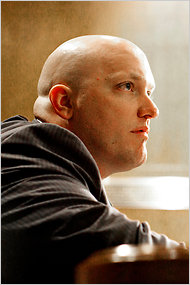Traumatic Brain Injury: Hidden Peril of U.S. Soldiers in Combat
Read more: http://www.time.com/time/world/article/0,8599,2109277,00.html#ixzz1ptv18DuH
Traumatic Brain Injury: Hidden Peril of U.S. Soldiers in Combat
Medical Schools to Increase Focus on PTSD, TBI

WASHINGTON — Medical schools will soon include more course work on post-traumatic stress disorder, traumatic brain injury and other common military ailments as part of a White House-led effort to prepare future physicians for the next generation of veteran patients.
First Lady Michelle Obama and officials from the Association of American Medical Colleges will announce the plans Wednesday afternoon. The effort includes more shared research and clinical trials among 130 medical and osteopathic schools around the country, including Ivy League and other major collegiate research institutions.
Officials from the association on Tuesday told reporters the goal is to ensure that young medical professionals are familiar with the signature wounds of war, and able to more effectively treat the millions of veterans who will struggle with those issues for decades to come.
White House officials said more than half of Iraq and Afghanistan veterans receiving treatment for mental health issues rely not on Department of Veterans Affairs physicians, but instead on private medical practices.
For some students, that will likely mean standalone courses on topics like PTSD and TBI, as well as other common battlefield injuries.
The effort is part of the first lady’s Joining Forces campaign, designed to highlight the sacrifices and needs of troops, veterans and their families. Program officials said no federal money is being used for the college coordination efforts, but Defense Department and VA officials will assist with planning and information sharing.
loading
Cost of Treating Veterans Will Rise Long Past Wars
Cost of Treating Veterans Will Rise Long Past Wars, 27 July 2010, NY Times
By: James Dao
WASHINGTON — Though the withdrawal of American military forces from Iraq and Afghanistan will save the nation billions of dollars a year, another cost of war is projected to continue rising for decades to come: caring for the veterans.
By one measure, the cost of health care and disability compensation for veterans from those conflicts and all previous American wars ranks among the largest for the federal government — less than the military, Social Security and health care programs including Medicare, but nearly the same as paying interest on the national debt, the Treasury Department says.
Ending the current wars will not lower those veterans costs; indeed, they will rise ever more steeply for decades to come as the population of veterans from Iraq and Afghanistan expands, ages and becomes more infirm. To date, more than 2.2 million troops have served in those wars.
Studies show that the peak years for government health care and disability compensation costs for veterans from past wars came 30 to 40 years after those wars ended. For Vietnam, that peak has not been reached.
In Washington, the partisan stalemate over cutting federal spending is now raising alarms among veterans groups and some lawmakers that the seemingly inexorable costs of veterans benefits will spur a backlash against those programs.
Even if cuts to veterans programs do not occur, the current mood of budgetary constraint seems likely to force the Department of Veterans Affairs to make do without the large spending increases it has received from Congress in the recent past.
That means efforts by veterans groups to expand existing health care programs, provide additional benefits to Vietnam veterans or institute new research into things liketraumatic brain injury or hearing loss will face difficult uphill battles, lawmakers and veterans advocates say.
“No one is thinking about the lifetime costs this country is responsible for,” said Senator Patty Murray, a Washington Democrat who is chairwoman of the Senate Veterans’ Affairs Committee. “I’m really worried.”
FULL ARTICLE AT: http://www.nytimes.com/2011/07/28/us/28veterans.html?_r=2
Study: Help Upfront Reduces Troops’ Mental Ills
Study: Help Upfront Reduces Troops’ Mental Ills, 18 Jan 2011, USA Today
By Gregg Zoroya
A battlefield study conducted by the Army on 20,000 soldiers during the troop surge in Iraq shows that more aggressive efforts to question and counsel GIs about their mental health reduce by nearly 80% the number who develop behavioral health illnesses during combat.
The results of the study, to be published today in the American Journal of Psychiatry, also show that 54% fewer soldiers contemplated suicide and that the number who needed to be sent home from Iraq with mental health problems dropped by nearly 70%.
“We’re excited about what this study shows,” says Maj. Gen. Patricia Horoho, Army deputy surgeon general. “It is the first direct evidence that a program (of more aggressive screening and treatment) is effective in preventing adverse behavioral health outcomes.”
The Army will begin using screening and treatment methods from the study within six months, Horoho says.
FULL ARTICLE AT: http://www.usatoday.com/printedition/news/20110118/iraqscreening18_st.art.htm
A year at War: Families Bear Brunt Of Deployment Strains
A year at War: Families Bear Brunt Of Deployment Strains, New York Times, 31 Dec 2010
By James Dao and Catrin Einhorn

Sgt. First Class Brian Eisch embraced his sons, Joey, 8, left; and Isaac, 12, before returning to his deployment in Afghanistan after a two week midtour leave
WAUTOMA, Wis. — Life changed for Shawn Eisch with a phone call last January. His youngest brother, Brian, a soldier and single father, had just received orders to deploy from Fort Drum, N.Y., to Afghanistan and was mulling who might take his two boys for a year. Shawn volunteered.
So began a season of adjustments as the boys came to live in their uncle’s home here. Joey, the 8-year-old, got into fistfights at his new school. His 12-year-old brother, Isaac, rebelled against their uncle’s rules. And Shawn’s three children quietly resented sharing a bedroom, the family computer and, most of all, their parents’ attention with their younger cousins.
The once comfortable Eisch farmhouse suddenly felt crowded.
”It was a lot more traumatic than I ever pictured it, for them,” Shawn, 44, said. ”And it was for me, too.”
The work of war is very much a family affair. Nearly 6 in 10 of the troops deployed today are married, and nearly half have children. Those families — more than a million of them since 2001 — have borne the brunt of the psychological and emotional strain of deployments.
Siblings and grandparents have become surrogate parents. Spouses have struggled with loneliness and stress. Children have felt confused and abandoned during the long separations. All have felt anxieties about the distant dangers of war.
Christina Narewski, 26, thought her husband’s second deployment might be easier for her than his first. But she awoke one night this summer feeling so anxious about his absence that she thought she was having a heart attack and called an ambulance. And she still jumps when the doorbell rings, worried it will be officers bearing unwanted news.
”You’re afraid to answer your door,” she said.
FULL ARTICLE AT: http://www.nytimes.com/2010/12/31/world/asia/31families.html?adxnnl=1&adxnnlx=1311686020-DFQfRXdPrGTC+NYYDk9yXw
A Fight To Recover
A Fight To Recover, St. Petersburg Times, 2 Jan 2011
By Drew Harwell
BETHESDA, Md. — Justin Gaertner lay naked in his hospital bed, a thin sheet rumpled along his waist. Metal staples lined his stomach. His thighs rounded into bandaged nubs.
It was the Monday before Christmas. Snow edged the sprawling campus of the National Naval Medical Center, far from Gaertner’s home in Trinity, Fla. Carolers echoed through the surgical ward halls, lined with young Americans torn apart by bombs and gunfire, and into a recovery room where the 21-year-old Marine lance corporal learned some unexpected news.
“So I’m going to piss all over myself, then?” he said, cutting his eyes at the two bedside corpsmen. They had come to remove his foley catheter, which Gaertner had depended on for the past three weeks, and he was agitated no one had taught him how to live without it. “I’d like to know before I go all over myself.”
Larry Dalla Betta, Gaertner’s stepfather since grade school, stood in a yellow isolation gown near the bed. His son’s frustrations were hard to watch. The three-year Marine was tough, independent and action-hungry. He lashed out at plans to prolong his treatment: “I’m a man, and I’m going to be treated like a man.”
The long window next to his bed, hazy from the cold outside, was dotted with holiday ornament stickers, a stocking and photos from home: his two younger siblings, a neighbor kissing his cheek, an ultrasound of his brother’s new baby. Larry and Jill Dalla Betta, Justin’s mother, had decorated his room for Christmas.
Three weeks earlier, on the day after Thanksgiving, Gaertner had managed to make one phone call home.
“Dad, I’ve been hit,” he said. “I’ve lost both my legs.”







